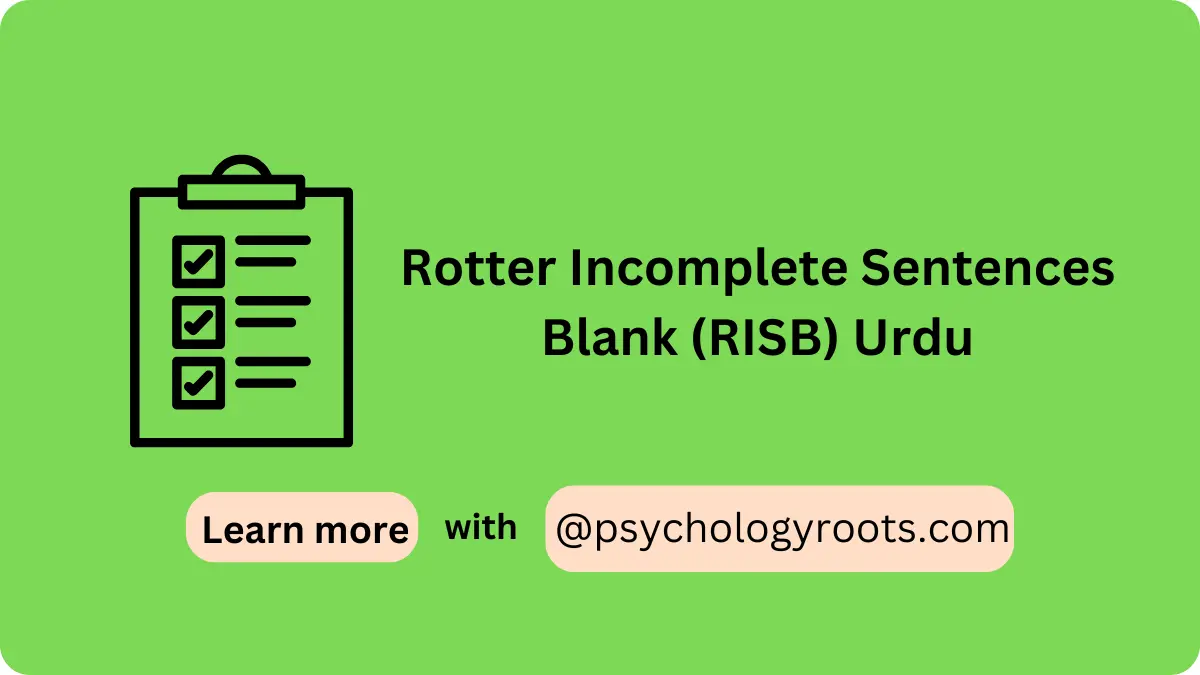Table of Contents
Rotter Incomplete Sentences Blank (RISB) Urdu
Here in this post, we are sharing the “Rotter Incomplete Sentences Blank (RISB) Urdu”. You can read psychometric and Author information. We have thousands of Scales and questionnaires in our collection (See Scales and Questionnaires). You can demand us any scale and questionnaires related to psychology through our community, and we will provide you with a short time. Keep visiting Psychology Roots.
About Rotter Incomplete Sentences Blank (RISB) Urdu
Scale Name
Rotter Incomplete Sentences Blank (RISB) Urdu
Author Details
Julian B. Rotter
Urdu Translator yet not confirmed
Translation Availability

Background/Description
The Rotter Incomplete Sentences Blank (RISB) is a projective psychological assessment tool designed to evaluate personality dynamics, emotional adjustment, and thought patterns through sentence completion. The Urdu version extends this tool to Urdu-speaking populations, ensuring cultural and linguistic relevance.
The RISB consists of sentence stems that respondents are required to complete. Their responses provide insights into underlying emotional states, interpersonal relationships, self-concept, and attitudes toward life. It is widely used in clinical, educational, and counseling settings to screen for psychological difficulties, gauge emotional adjustment, and explore individual personalities.
The Urdu adaptation of the RISB adheres to the principles of the original version while incorporating cultural nuances to ensure accurate interpretation of responses. This makes it a valuable tool in Pakistani contexts, particularly for psychologists and counselors working with diverse populations.
Administration, Scoring and Interpretation
- Obtain a copy: Acquire the Urdu version from authorized publishers or academic sources.
- Explain the purpose: Clarify that the tool aims to explore emotions and thought patterns to support psychological assessment.
- Provide instructions: Guide respondents to complete the sentence stems honestly and quickly without overthinking.
- Approximate time: The assessment typically takes 20–30 minutes to complete.
- Administer the scale: Conduct the test in a quiet environment to minimize distractions and encourage focus.
Reliability and Validity
- Reliability: The Urdu version demonstrates acceptable internal consistency and test-retest reliability, consistent with the psychometric standards of the original RISB.
- Validity: Studies indicate strong construct and content validity, ensuring the tool’s effectiveness in capturing emotional and psychological states in Urdu-speaking populations.
Available Versions
40-Items
Reference
Rotter, J. B. (1950). The Rotter Incomplete Sentences Blank manual. Psychological Corporation.
Important Link
Scale File:
Frequently Asked Questions
Q1: What is the RISB used for?
The RISB is used to assess emotional adjustment, personality traits, and thought patterns.
Q2: Is the Urdu version culturally adapted?
Yes, the Urdu version includes cultural adaptations to ensure relevance and accuracy in responses.
Q3: Can it be used for children and adults?
Yes, the RISB has versions suitable for children, adolescents, and adults.
Q4: How are the responses interpreted?
Responses are scored and analyzed to identify emotional states, interpersonal dynamics, and psychological adjustment levels.
Q5: Is it commonly used in Pakistan?
Yes, it is widely used in educational, clinical, and counseling settings in Pakistan.
Disclaimer
Please note that Psychology Roots does not have the right to grant permission for the use of any psychological scales or assessments listed on its website. To use any scale or assessment, you must obtain permission directly from the author or translator of the tool. Psychology Roots provides information about various tools and their administration procedures, but it is your responsibility to obtain proper permissions before using any scale or assessment. If you need further information about an author’s contact details, please submit a query to the Psychology Roots team.
Help Us Improve This Article
Have you discovered an inaccuracy? We put out great effort to give accurate and scientifically trustworthy information to our readers. Please notify us if you discover any typographical or grammatical errors.
Make a comment. We acknowledge and appreciate your efforts.
Share With Us
If you have any scale or any material related to psychology kindly share it with us at psychologyroots@gmail.com. We help others on behalf of you.